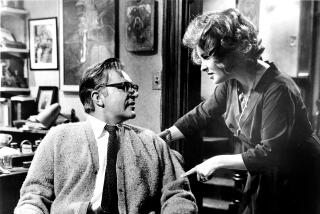‘Letter’ Pushes Envelope for 1940s
- Share via
The missive in “A Letter to Three Wives” starts out innocently but soon becomes a monster. Once the usual scribbled pleasantries are out of the way, the letter turns nasty. Addie, who wrote it, informs three friends she’s planning to run away with one of their husbands.
From there, the 1949 movie (screening Friday afternoon as part of the Cypress Senior Citizen Center’s ongoing free film series) becomes a suburban mystery intent on peering into the women’s marriages.
Now faced with figuring out which man has strayed, the wives are pushed from their domestic routines and forced to evaluate the relationships they’ve chosen. It’s not always a pretty picture as director Joseph L. Mankiewicz uses sometimes melodramatic, sometimes humorous flashbacks to let us know just how jagged the edges are.
The first shows Deborah (Jeanne Crain), a socially backward girl trying to fit into high society with her country club smoothie Brad (Jeffrey Lynn). The next centers on Rita (Ann Sothern), a too-busy radio soap opera writer linked to George (Kirk Douglas), an idealistic, underpaid teacher.
The last gives us the great-looking, gold-digging Lora May (Linda Darnell), who wins the ultra-rich Porter (Paul Douglas) but doesn’t seem to be happy about it. Porter isn’t too thrilled by the arrangement, either.
These days, “A Letter to Three Wives” may seem overly quaint, but it was fairly provocative in the late ‘40s, a time when family values may have been the staunchest part of the American foundation.
Few movies with domestic themes attempted to cast a critical eye at the traditions of marriage or raise the issue of extramarital affairs. And even though the film opts for a small smile of an ending, Mankiewicz provides barbs along the way. Further, the narrative technique was unusual for the period. Addie, for instance, is never seen; we only hear her slightly superior, somewhat sneering voice (Celeste Holm did the honors) as the wives sink into doubt.
That’s a smart idea; without seeing Addie as a concrete presence, she becomes less of a villainess and more of a vague symbol of danger. Mankiewicz won the Oscar for his screenplay along with the best director award.
The “serious” message that, ultimately, we should be happy with what we have and try to protect it, isn’t hard to swallow, mainly because Mankiewicz and his actors bring a comic chagrin to most scenes that help to keep everything in perspective.
In fact, the casting often seems inspired. Sothern, with her breezy brittleness, is perfectly pitched as the forever-occupied Rita.
As for the guys, Kirk Douglas goes against type with the self-consciously intellectual George, but it works.
The same for steady, wry Paul Douglas, who turns Porter into one big hound dog of a character, tired out by the exasperating hunt that his marriage has become but still willing to take another run through the tangled woods.
*
What: Joseph L. Mankiewicz’s “A Letter to Three Wives.”
When: Friday, Jan. 28, at 12:45 p.m.
Where: The Cypress Senior Citizen Center, 9031 Grindlay St., Cypress.
Whereabouts: Take the San Gabriel River (605) Freeway to Lincoln Avenue and head east to Grindlay Street, then go right.
Wherewithal: Free.
Where to call: (714) 229-6776.
More to Read
Only good movies
Get the Indie Focus newsletter, Mark Olsen's weekly guide to the world of cinema.
You may occasionally receive promotional content from the Los Angeles Times.









